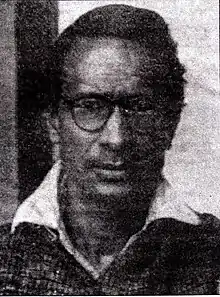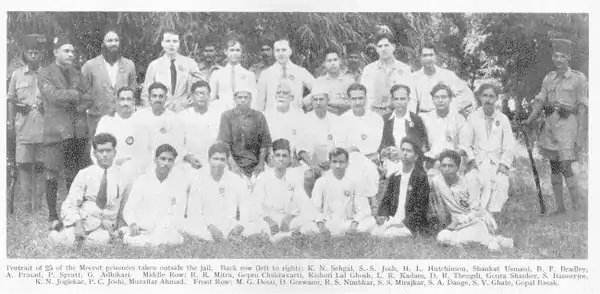Gangadhar Adhikari
Dr. Gangadhar Adhikari (1898 – 1981)[1] was a prominent Marxist theoretician and prolific writer.[2] He was the former general secretary of the Communist Party of India (CPI), one of the oldest political parties in India. He was a chemical scientist who earned his Ph.D. degree in Berlin in 1927. He worked with some of the best scientists, attending lectures by Max Planck and Albert Einstein.[3]
Gangadhar Adhikari | |
|---|---|
 | |
| General Secretary of the Communist Party of India | |
| In office 1933–1935 | |
| Preceded by | S.V. Ghate |
| Succeeded by | P.C. Joshi |
| Personal details | |
| Born | 1898 |
| Died | 1981 (aged 82–83) |
| Nationality | Indian |
| Political party | Communist Party of India |
| Occupation | Theoretician |
Biography

Adhikari was in Germany between 1922 and 1928 and was attracted to Marxism. He joined the German Communist Party. He returned to India in 1928 and joined the Communist Party of India. He was arrested in the Meerut Conspiracy Case. Albert Einstein wrote an open letter to the British Prime Minister Ramsay MacDonald seeking release of the scientist Adhikari.[3]
Adhikari was elected the General Secretary of Communist Party of India in the National Conference held at Kolkata in 1933.
Adhikari was a member of the CPI Politburo 1943-1951.[4]
Adhikari's position on the national question, published in 1943 under the name Pakistan and Indian National Unity, was inspired by Joseph Stalin's Marxism and the National Question as it stressed the importance of a nationality to share a common language, a defined territory and a common national consciousness.[4]
He compiled the ten volume Documents of the Communist Party of India.[5]
Notes
- "Adhikari, Gangadhar 1898 – 1981". Communist Party of India (Marxist). 20 February 2015. Retrieved 19 July 2020.
- "Latest Volume18-Issue12 News, Photos, Latest News Headlines about Volume18-Issue12". Frontline. Retrieved 19 July 2020.
- Shaikh, Juned (2011). "Translating Marx: Mavali, Dalit and the Making of Mumbai's Working Class, 1928-1935". Economic and Political Weekly. 46 (31): 65–73. ISSN 0012-9976. JSTOR 23017878 – via JSTOR.
- Kamran Asdar Ali (2015). Surkh Salam: Communist Politics and Class Activism in Pakistan, 1947-1972. p. 296. ISBN 978-0-19-940308-0.
- Zene, Cosimo (23 October 2013). The Political Philosophies of Antonio Gramsci and B. R. Ambedkar: Itineraries of Dalits and Subalterns. Routledge. ISBN 978-1-134-49408-8.